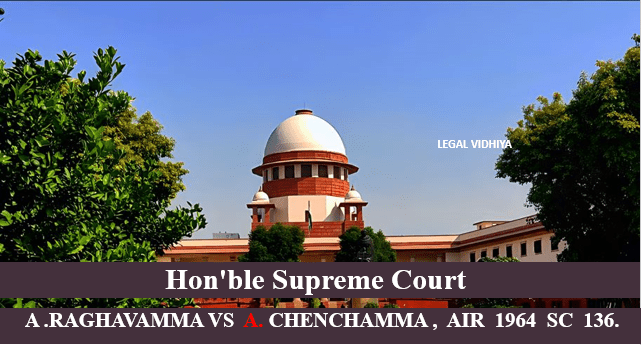
| Citation | AIR 1963 SC 136 |
| Date of Judgment | April 09, 1963 |
| Court | SUPREME COURT OF INDIA |
| Case Type | Dealt with the partition and interpretation of a will regarding the hindu joint family property. |
| Application | A.Raghavamma |
| Respondent | A.Chenchamma |
| Bench | K Subbarao, Madholkar, Raghubar Dayal |
| Referred | Hindu law |
FACTS OF THE CASE
- Two brothers; B1 and B2 , made up a Hindu Joint Family. B2W wife i.e. Raghavamma ( appellant) is B2’s widow, who predeceased B1. B1S is B1’s sole son, died before his father, leaving behind his widow i.e. B1SW i.e. Chenchamma ( respondent) and small son B1SS ( Subbarao).
- As a result , the participants eventually comprised B1 and B1SS. B1 died in 1945 , leaving B1SS as the last surviving participant. B1SS died in 1949 before reaching the age of majority.
ISSUES
- Is it possible that the testator grew estranged from his joint family prior to his death only because of the legal portion that will only apply from the date of testator’s death ?
- Is it true that a member of a Hindu joint family is separated from the other members of the family simply by declaring his clear desire to leave he family without informing the other members of the family ?
- Is awareness of such an expressed purpose by the other affected family members a required condition for establishing a status division?
ARGUMENTS
Plaintiff managed the property according to will’s direction , permitted the property to the defendant to handle assuming possession on behalf of her youngerson and B1DD after B1 (Legator) died, the plaintiff was entitled to his half part of the property as fixed in the will.
Defendant argued that because B1SS was the only surviving co-heir, his portion would be pass to her mother according to inheritance rather than will’s instructions. His major part was that when B1 performed this will, he was an undivided co-heir, he did not have any legal authority to make a will for his undivided part. As a result, the will was void and cannot be carry forward.
JUDGEMENT
Bench analysed the joint status severance in two parts as a declaration of intent and dissemination to others who may be affected.
For first component the law is clear, a dissolution of joint status is a matter of individual judgement and for that an unmistakable declaration must be made if even no separation occurs.Because dissolution is a mental state,and the statement is only an expression of that mental state, dissolution arise from the simple declaration.
For the second component, the Supreme Court stated that it is inherent in the idea of declaration that it is brought to the attention of those who are impacted by it. It means the other co-heir must be ‘clearly informed’ of declared purpose.If the co-heir did not transmit his desire to be separated from other co-heir during his lifetime, the simple statement of his desire stated or manifested did not result in dissolution in status.
Appeal dismissed.
REFERENCES
This Article is written by Bhaavya Mishra of Vikramajit Singh Sanatan Dharma College, Intern at Legal Vidhiya.




0 Comments